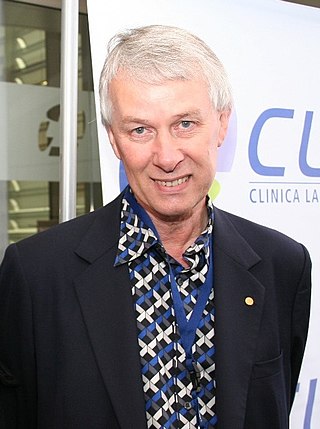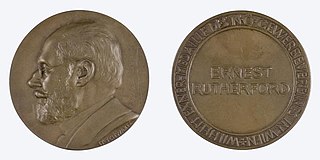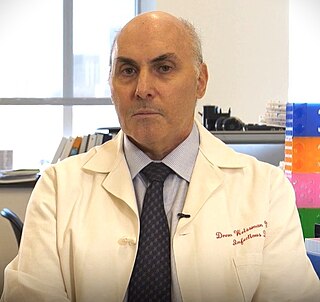Related Research Articles

Sir Richard John Roberts is a British biochemist and molecular biologist. He was awarded the 1993 Nobel Prize in Physiology or Medicine with Phillip Allen Sharp for the discovery of introns in eukaryotic DNA and the mechanism of gene-splicing. He currently works at New England Biolabs.
The Lewis S. Rosenstiel Award for Distinguished Work in Basic Medical Research is awarded by Brandeis University. It was established in 1971 "as an expression of the conviction that educational institutions have an important role to play in the encouragement and development of basic science as it applies to medicine".
The Louisa Gross Horwitz Prize for Biology or Biochemistry is an annual prize awarded by Columbia University to a researcher or group of researchers who have made an outstanding contribution in basic research in the fields of biology or biochemistry.
Sir Philip Cohen is a distinguished British biochemist known for his extensive contributions to the field of biochemistry, especially to the understanding of the role of reversible protein phosphorylation in cell regulation.
The Grande Médaille of the French Academy of Sciences, established in 1997, is awarded annually to a researcher who has contributed decisively to the development of science. It is the most prestigious of the Academy's awards, and is awarded in a different field each year. Its creation results from the combination of the original French Academy of Sciences Lalande Prize of 1802 with the Benjamin Valz Foundation Prize in 1970 and then with another 122 foundation prizes in 1997.
The Albany Medical Center Prize in Medicine and Biomedical Research is the United States' second highest value prize in medicine and biomedical research, awarded by the Albany Medical Center. Among prizes for medicine worldwide, the Albany Medical Center Prize is the fourth most lucrative.
The Paul Ehrlich and Ludwig Darmstaedter Prize is an annual award bestowed by the Paul Ehrlich Foundation since 1952 for investigations in medicine. It carries a prize money of 120,000 Euro. The prize awarding ceremony is traditionally held on 14 March, the birthday of Nobel laureate Paul Ehrlich, in the St. Paul's Church, Frankfurt am Main.
The Keio Medical Science Prize is a Japanese prize in medical sciences.

David Jay Julius is an American physiologist and Nobel Prize laureate known for his work on molecular mechanisms of pain sensation and heat, including the characterization of the TRPV1 and TRPM8 receptors that detect capsaicin, menthol, and temperature. He is a professor at the University of California, San Francisco.

Sir Stephen Patrick O'Rahilly is an Irish-British physician and scientist known for his research into the molecular pathogenesis of human obesity, insulin resistance and related metabolic and endocrine disorders.

Michael Nip Hall is an American-Swiss molecular biologist and professor at the Biozentrum of the University of Basel, Switzerland. He discovered TOR, a protein central for regulating cell growth.

The Wilhelm Exner Medal has been awarded by the Austrian Industry Association, Österreichischer Gewerbeverein (ÖGV), for excellence in research and science since 1921.

Derrick J. Rossi, is a Canadian stem cell biologist and entrepreneur. He is a co-founder of the pharmaceutical company Moderna.
Valina L. Dawson is an American neuroscientist who is the director of the Programs in Neuroregeneration and Stem Cells at the Institute for Cell Engineering at the Johns Hopkins University School of Medicine. She has joint appointments in the Department of Neurology, Neuroscience and Physiology. She is a member of the Graduate Program in Cellular and Molecular Medicine and Biochemistry, Cellular and Molecular Biology.
The School of Life Sciences at the University of Dundee conducts research into the molecular and cellular mechanisms underlying human health and disease.

Katalin "Kati" Karikó is a Hungarian-American biochemist who specializes in ribonucleic acid (RNA)-mediated mechanisms, particularly in vitro-transcribed messenger RNA (mRNA) for protein replacement therapy. Karikó laid the scientific groundwork for mRNA vaccines, overcoming major obstacles and skepticism in the scientific community. Karikó received the Nobel Prize in Physiology or Medicine in 2023 for her work, along with American immunologist Drew Weissman.

Drew Weissman is an American physician and immunologist known for his contributions to RNA biology. Weissman is the inaugural Roberts Family Professor in Vaccine Research, director of the Penn Institute for RNA Innovation, and professor of medicine at the Perelman School of Medicine at the University of Pennsylvania (Penn).

The 2023 Nobel Prize in Physiology or Medicine was awarded to Katalin Karikó and Drew Weissman "for their discoveries concerning nucleoside base modifications that enabled the development of effective mRNA vaccines against COVID-19".
References
- ↑ "Debrecen Award for Molecular Medicine". Archived from the original on 2016-12-22.
- ↑ "Katalin Karikó was awarded at the University of Debrecen". The Debrecen Sun. 2021-12-17. Retrieved 2021-12-21.